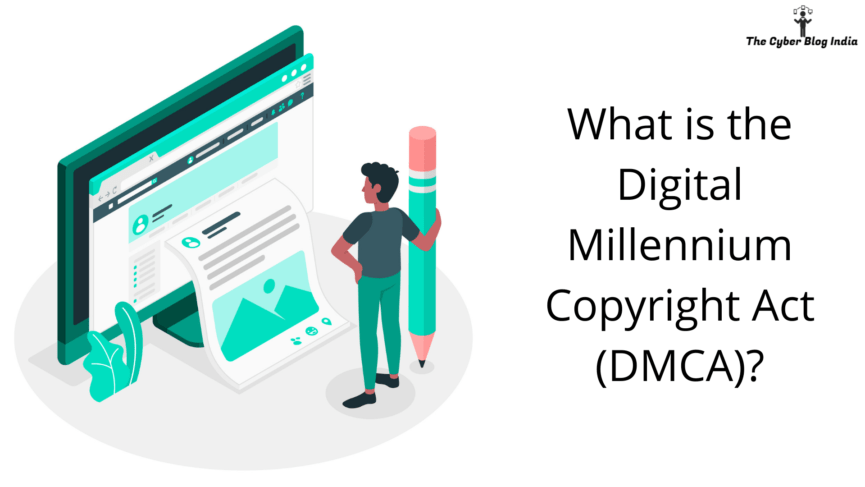What is the Digital Millennium Copyright Act (DMCA)?

Have you ever wondered what happens when someone verbatim copies our articles and re-publishes them on their website without our permission? Well, it is a copyright violation. Copyright is an intellectual property right that grants the owner an exclusive right to use the work. Copyright protection is available for TV shows, movies, videos, sound recordings, lectures, articles, books, paintings, posters, computer software, video games, plays, musicals, etc. Laws across the globe grant protection to different intellectual properties such as literature, dramatic/artistic works, trademarks, designs, patents, etc.
One such law that protects copyrights is the Digital Millennium Copyright Act (DMCA) in the USA. This Act adopts the principles laid down in the WIPO Copyright Treaty and WIPO Performances and Phonograms Treaty, both signed in 1996. DMCA came into force in 1998, and it aims to protect the rights of copyright owners in the digital space. DMCA was the first major copyright-related law in the US that came into effect after the Copyright Act of 1976. The US lawmakers realised that digital medium allowed for making infinite copies of copyright-protected work and the existing copyright law was limited to prescribing fines and punishments for copyright violations.
What does DMCA protect?
The second portion of DMCA Title I, also referred to as DMCA anti-circumvention provisions modified the remedies available for circumventing technical protection measures. The Act makes it a criminal offence for individuals to circumvent digital rights management and access control measures, irrespective of whether there is a violation of copyrights. However, there are certain activities that are exempted from this general rule, such as:
- Conducting encryption research to find the vulnerabilities in the protective layer of the copyrighted work
- Conducting security research exercises for applications, software, and computer systems
- Bypassing protection measures in good faith and bonafide intentions
- Using for educational purposes at libraries
DMCA provides remedies for situations such as:
- If someone disseminates your personally identifiable information without your consent, you have a remedy under Section 1201(i). The ambit of personally identifiable information also includes your activities in the cyber space.
- When a person shares, transmits or uses copyrighted work without the permission of the rightful copyright owner, it becomes a case of copyright violation.
DMCA Title III provides protection to individuals involved in the repairing and maintenance of computer programs. Title III expands the scope of an existing exemption in Section 117 of the Copyright Act. It allows protection when copies of computer programs are made during the maintenance or repairing of a computer system.
Where does DMCA stand on analog and digital broadcasters?
DMCA distinguishes between analog and digital broadcasters while deciding the liability for violating copyrights. Section 1201(k) specifies the liability when information broadcasting through an analog medium violates copyrights. Devices in analog medium can include VHS players, cassettes, CDs, etc. The Act recognises the economic and technological hardships faced by analog broadcasters due to the emergence of digital broadcasters. Hence, if an analog broadcaster did not intend to violate the copyrights, DMCA grants them an exemption from their liability.
As for digital broadcasters, including intermediaries and ISPs, the Act provides exemptions in the following situations:
- third-parties posting copyrighted content on their network,
- when a broadcaster did not have any role in the transmission,
- a broadcaster did not change the transmitted content, and
- a broadcaster did not retain or make a copy of the content in question.
Are search engines liable under DMCA?
Search engines like Google, Yahoo, and Bing help us get the information we seek. DMCA grants protections to search engines in certain cases as it considers them as online service providers (OSPs). DMCA Title II, or the Online Copyright Infringement Liability Limitation Act, provides for a safe harbour for online service providers. Title II adds a new section to the Copyright Act for deciding the liability of OSPs. It classifies OSPs into four categories: system caching, information location tools, storage of information on systems or networks at users’ directions, and transitory communications.
OSPs must adhere to the safe harbour guidelines to claim protection against copyright infringement liability. These guidelines include:
- not deriving any profits from the circulation of the copyrighted material,
- they take down the content in question when it comes to their knowledge, and
- when they take down the content, they inform the copyright owners of the takedown.
Remedies and compensation
Under DMCA, a copyright owner has both civil and criminal remedies available. Section 1203 talks about civil remedies such as injunction, damages, and destruction of devices. Section 1204 focuses on criminal remedies and includes fines and imprisonment. A party whose copyrights are affected can send a takedown notice to the concerned online service provider. This notice must fulfil the requirements specified in Section 512(c). In one of our upcoming articles, we will elaborate on the DMCA takedown procedure.
Conclusion
DMCA provides for the protection of copyright in cyber space and is an intricate piece of law. The Act itself was very advanced for its time and is something from which India needs to take inspiration. In the Indian scenario, there are a lot of ambiguities in the existence and functioning of traditional works in the digital medium. India also needs to develop a dedicated law for governing copyrights in digital spaces.
Featured Image Credits: Social media vector created by stories – www.freepik.com
